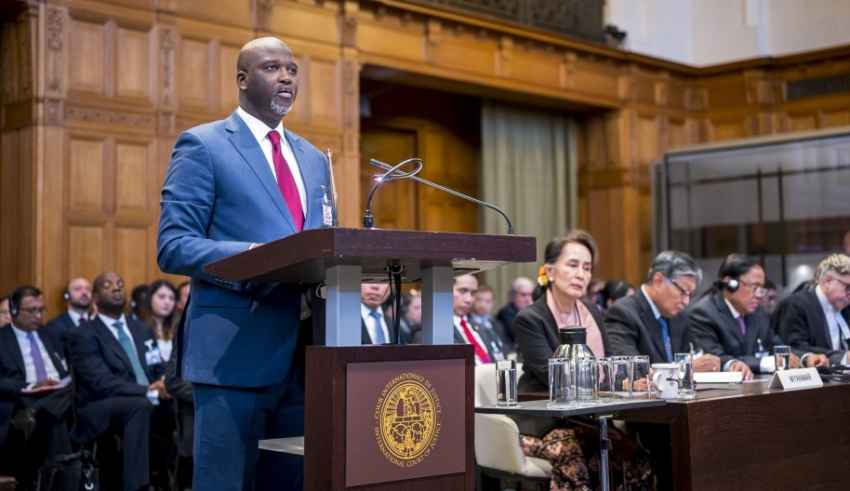
Recently, The Gambia state initiated a proceedings in the United States courts against Facebook. The proceeding was intended to compel the Facebook to reveal relevant information which Gambia seeks use in the case against Myanmar which was brought before International Court of Justice(ICJ). Accordingly, On September 22, 2021, a US court ordered Facebook to disclose materials relating to the perpetration of ethnic hatred against the Rohingya Muslim-minority in Myanmar (Becker,2021). Given the importance of these inter-related proceedings, in this article, certain legal aspects of both will be addressed.
Background of Rohingya human rights crisis
following the humanitarian crisis in Myanmar, the UN intervened and In April 2017, the UN Human Rights Council established the Independent International Fact-Finding Mission(FFM) on Myanmar. The aim of the FFM was to investigate alleged human rights abuses by military and security forces. Ultimately, a report was published in 2018 (Becker,2018).
Accordingly, the FFM found that the start of the crisis refers to attacks of an armed group called the “Arakan Rohingya Salvation Army” against government military outposts on August 2017 which resulted to at least 10,000 deaths and 725,000 refugee. The Myanmar authorities termed their operations “clearance operations” which aimed for elimination of a terrorist threat (Ibid).
Overview of the Gambia v. Myanmar case
In November 2019, The Republic of The Gambia submitted an application against the Republic of the Union of Myanmar (“Myanmar”) before the ICJ alleging violations of the Convention on the Prevention and Punishment of the Crime of Genocide (the “Genocide Convention”) through “acts adopted, taken and condoned by the Government of Myanmar against members of the Rohingya group” (ICJ,2019).
In particular, The Gambia contends that “from around October 2016 the Myanmar military (the ‘Tatmadaw’) and other Myanmar security forces began widespread and systematic ‘clearance operations’ against the Rohingya group. The genocidal acts committed during these operations were intended to destroy the Rohingya as a group, in whole or in part, by the use of mass murder, rape and other forms of sexual violence, as well as the systematic destruction by fire of their villages, often with inhabitants locked inside burning houses. From August 2017 onwards, such genocidal acts continued with Myanmar’s resumption of ‘clearance operations’ on a more massive and wider geographical scale.”(Ibid)
Therefore, The Gambia argues that these acts amount to violations of the Genocide Convention. Also, concerning the Court’s jurisdiction to this dispute, It invokes to Article 36, paragraph 1, of the Statute of the Court and on Article IX of the Genocide Convention, to which both States are parties(Ibid).
In sum, The Gambia requests ICJ to declare the following (Rist,2020);
- Myanmar has violated the provisions of the Genocide Convention;
- Myanmar must cease any acts that violate the Convention (in effect, stop committing genocide), but also to implement its obligation to prevent genocide;
- Myanmar must hold individuals who committed acts in violation of the Genocide Convention criminally accountable within its domestic legal system;
- Myanmar must pay reparations to the victims of the Rohingya, including allowing them to return to Myanmar, reinstating their citizenship, and undertaking protection of the group’s human rights; and
- Myanmar must demonstrate its intent to not commit further violations of the Genocide Convention
Initiation of a proceeding by Gambia against Facebook
after the, The United Nations Fact-Finding Mission investigated into how Facebook was utilized by state and non-state actors to promote hateful and violent rhetoric against Rohingya minority (Becker,2021). Also, Facebook’s internal investigation on the use of this social media in Myanmar in August 2018 led to removal of 425 Facebook pages, 17 Facebook groups, 135 Facebook accounts, and 15 Instagram accounts for engaging in ‘coordinated inauthentic behavior’. also, 20 individuals and entities were banned Facebook, including Senior General Min Aung Hlaing and the Myawady television network(Ibid).
Accordingly, Facebook’s actions made accounts and pages inaccessible to users but Facebook retained the material. In this sense, in order to prove its claims in the case before ICJ, Gambia, in accordance with a provision of U.S. law – §1782 of the U.S. Code, requested access to anti-Rohingya contents on facebook which are not accessible. This provision, permits the compelling of testimony, statements, or documentation “…for use in a proceeding in a foreign or international tribunal, including criminal investigations conducted before formal accusation.” (Pillai, 2020)
On the other hand, Facebook opposed the claims and raised two-fold arguments. First, Facebook argued that the Stored Communications Act (SCA) (28 USC §2702) prevent it from disclosing the online contents. secondly, as the request was overly burdensome and the information could be sought through other channels, the court should decline the request and consider other channels (Becker,2021).
Ultimately, the court rejected Facebook’s arguments and granted The Gambia’s request for ‘de-platformed content and related internal investigation documents’ (Ibid). The US court concluded that Facebook has placed great importance on ‘remediation efforts for its role in what happened in Myanmar’ by its previous internal investigation. Nevertheless, it is time for Facebook to make good on that commitment (Ibid).
Bibliography
Becker,2021, “The Gambia v Facebook: Obtaining Evidence for Use at the International Court of Justice (Part I)”, accessed 7 October 2021 < https://www.ejiltalk.org/the-gambia-v-facebook-obtaining-evidence-for-use-at-the-international-court-of-justice-part-i/ >.
Becker,2018, “The Situation of the Rohingya: Is there a role for the International Court of Justice?”, accessed 7 October 2021 < https://www.ejiltalk.org/the-situation-of-the-rohingya-is-there-a-role-for-the-international-court-of-justice/ >.
ICJ,2019. “Press Release; The Republic of The Gambia institutes proceedings against the Republic of the Union of Myanmar and asks the Court to indicate provisional measures”
Pillai, 2020, “The Republic of The Gambia v Facebook, Inc.: Domestic Proceedings, International Implications”, accessed 7 October 2021 < http://opiniojuris.org/2020/08/08/the-republic-of-the-gambia-v-facebook-inc-domestic-proceedings-international-implications/ >.
Rist,2020, “What does the ICJ decision on The Gambia v. Myanmar mean?”, accessed 8 October 2021 <https://www.asil.org/insights/volume/24/issue/2/what-does-icj-decision-gambia-v-myanmar-mean >.
By The European Institute for International Law and International Relations.















